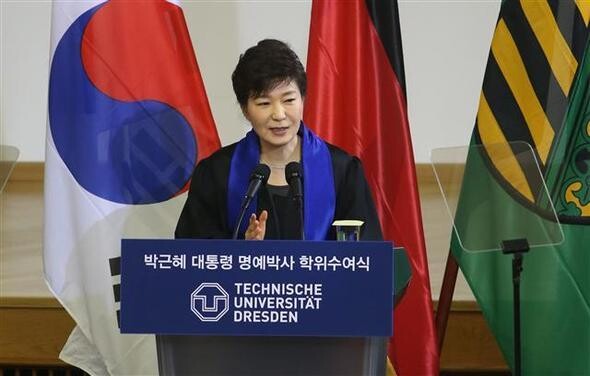hankyoreh
Links to other country sites 다른 나라 사이트 링크
North Korea lashes out at Park’s unification declaration

By Kim Oi-hyun, staff reporter
North Korea came out in strong criticism of the three proposals President Park Geun-hye made in her Dresden Declaration at the end of March, dismissing them as being “not worth any consideration.” While this puts the South Korean government - which has taken repeated steps to urge the North to respond positively - in an awkward position, the North might not mean to cut off relations with South Korea.
In a statement released by its spokesperson on Apr. 12, North Korea’s National Defense Commission derided Park’s Dresden Declaration as “the detritus of the age, rife with betrayal of the Korean people, hypocrisy, and opposition to unification.”
The North took issue with how Park argued for the dismantling North Korea’s nuclear weapons program during the 2014 Nuclear Security Summit at The Hague, arguing that the three proposals to the North were merely peripheral issues that have little to do with improving inter-Korean relations. The statement also noted that the fact that the speech was made in Germany implies that Park was thinking of unification by absorption.
The expressions used in the statement were extremely harsh, referring to Park without the appropriate honorific title and deploying invectives such as “her disgusting snout” and “worse than an intellectually stunted country bumpkin.”
South Korean Foreign Minister Yun Byung-se was slammed as “a premature baby, politically speaking” and Unification Minister Ryoo Kihl-jae was insulted as being “the dregs of humanity.”
But reading between the lines in the statement, the message that North Korea is trying to communicate becomes comparatively clear. First of all, North Korea said that the very fact that Park Geun-hye made the speech in Germany, which “was reunified through absorption,” was evidence of her “impure intentions.” Turned on its head, this can be interpreted as North Korea asking the South to prove that the Dresden Declaration was not made with unification by absorption in mind.
Nor can we conclude that North Korea has entirely given up on the idea of dialogue. “The unstoppable journey to achieve the reconciliation and unity of the Korean people and to move toward autonomous and peaceful unification is a just one, and it is what the age demands. No one can resist it,” the statement said.
“On the whole, North Korea seems to have reiterated its standard position to South Korea - emphasizing mutual respect and bashing unification by absorption - while also calling for a change in policy,” said Chang Yong-seok, senior researcher at Institute for Peace and Unification Studies at Seoul National University.
“The North is probably trying to say that, in order to build trust, the South needs to accept its request, just as the North accepted the South’s proposal to hold reunions for the divided families,” said Yang Moo-jin, professor at the University of North Korean Studies.
The South Korean government appears to be refraining from making an official response. “We have to assume that they have rejected our proposal for now,” a government source said on condition of anonymity Apr. 13. “We’ll have to wait and see what happens next.”
Please direct questions or comments to [english@hani.co.kr]

Editorial・opinion
![[Column] Is Korean democracy really regressing? [Column] Is Korean democracy really regressing?](https://flexible.img.hani.co.kr/flexible/normal/500/300/imgdb/original/2024/0705/2917201664129137.jpg) [Column] Is Korean democracy really regressing?
[Column] Is Korean democracy really regressing?![[Column] How tragedy pervades weak links in Korean labor [Column] How tragedy pervades weak links in Korean labor](https://flexible.img.hani.co.kr/flexible/normal/500/300/imgdb/original/2024/0703/8717199957128458.jpg) [Column] How tragedy pervades weak links in Korean labor
[Column] How tragedy pervades weak links in Korean labor- [Column] How opposing war became a far-right policy
- [Editorial] Korea needs to adjust diplomatic course in preparation for a Trump comeback
- [Editorial] Silence won’t save Yoon
- [Column] The miscalculations that started the Korean War mustn’t be repeated
- [Correspondent’s column] China-Europe relations tested once more by EV war
- [Correspondent’s column] Who really created the new ‘axis of evil’?
- [Editorial] Exploiting foreign domestic workers won’t solve Korea’s birth rate problem
- [Column] Kim and Putin’s new world order
Most viewed articles
- 110 days of torture: Korean mental patient’s restraints only removed after death
- 2Months after outcry over “torture devices,” Justice Ministry proposes more restraints for immigratio
- 3Beleaguered economy could stymie Japan’s efforts to buoy the yen
- 4[Column] Is Korean democracy really regressing?
- 5Koreans are getting taller, but half of Korean men are now considered obese
- 6[Column] How tragedy pervades weak links in Korean labor
- 7Former bodyguard’s dark tale of marriage to Samsung royalty
- 8Real-life heroes of “A Taxi Driver” pass away without having reunited
- 9[Editorial] Exploiting foreign domestic workers won’t solve Korea’s birth rate problem
- 10Democrats ride wave of 1M signature petition for Yoon to be impeached